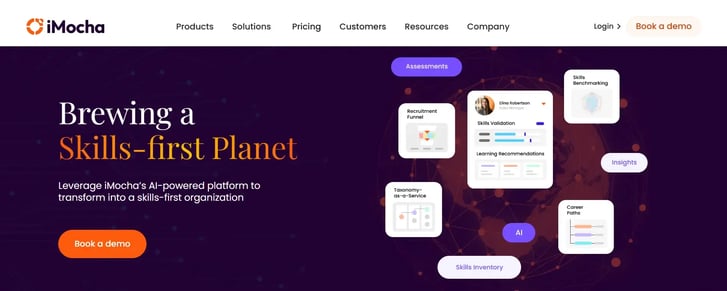In today’s rapidly evolving workplace, job roles are transforming faster than ever—leaving organizations scrambling to keep pace. According to a recent World Economic Forum report, 44% of workers' skills are expected to change by 2027, underscoring the urgent need for companies to rethink how they manage and develop talent.
Relying on outdated spreadsheets or manual tracking methods leads to mismatched hiring, ineffective training programs, and missed opportunities for growth and innovation.
The solution? A powerful skills taxonomy software.
A skills taxonomy provides a structured way to organize, categorize, and align employee skills with evolving job roles and strategic business goals. It lays the groundwork for a future-ready, agile workforce. One that can respond to market shifts, adopt new technologies, and grow from within.
With the right platform, companies can:
- Identify skill gaps in real-time
- Drive internal mobility and reskilling
- Personalize learning and development
- Future-proof their workforce strategy
In this blog, we’ll explore the top 10 skills taxonomy software empowering organizations to stay competitive, resilient, and talent-aligned in 2026.
Benefits of Implementing a Skills Taxonomy
A well-structured skills taxonomy serves as the backbone of any forward-thinking talent strategy. It helps organizations move from reactive hiring and training approaches to a proactive, skills-first mindset. Here’s how businesses benefit from implementing a skills taxonomy:
- Improved Talent Visibility: A centralized skills taxonomy provides a clear, unified view of your workforce’s capabilities. HR and business leaders can instantly see what skills exist across teams, what’s missing, and where expertise is underutilized. Think of it as a dynamic skills map that keeps talent aligned with business strategy.
- Accurate Skill Gap Analysis: By comparing current workforce skills against evolving role requirements or future business goals, a taxonomy enables precise skill gap identification. This insight supports better workforce planning and targeted development initiatives.
- Personalized Learning & Development: A skills taxonomy allows organizations to map learning content to skill gaps, creating personalized learning journeys for employees. This not only boosts engagement but also accelerates upskilling and reskilling efforts. Employees get training that’s truly relevant to their roles and career goals.
- Stronger Internal Mobility & Career Pathing: When skills are well-defined and standardized, it’s easier to match employees with internal opportunities, such as projects, gigs, or new roles. This boosts retention and helps build a more agile, future-ready workforce.
- Better Hiring Decisions: Integrating a skills taxonomy into hiring workflows ensures that job descriptions, assessments, and interviews are aligned with actual skill needs. This leads to more accurate hiring, reduced time-to-fill, and better-quality candidates.
- Enhanced Strategic Workforce Planning: Organizations can align talent strategy with business goals by forecasting the future skills they’ll need. A skills taxonomy enables more strategic decisions around talent acquisition, development, and succession planning.
- Support for Skills-Based Practices: From compensation to promotion, performance, and workforce analytics—a skills taxonomy underpins a skills-based organization. It allows for fairer, data-driven decisions that prioritize capabilities over credentials.
|
Table of contents #10 Retrain |
Top 10 Skills Taxonomy Software in 2026 to Optimize Workforce Skills
iMocha offers a skills taxonomy that uses AI to build an organized list of skills for many industries. It helps companies standardize how they define skills, improve hiring (big deal!), & set up training programs that match their business plans. It also helps with validating skills to make things run smoother.
Here’s why iMocha stands out as a top skills taxonomy software:
- AI-Driven Skill Mapping: It uses AI to build & keep a lively skills framework that stays relevant across different jobs and industries.
- Customizable Skills Framework: Companies can change the taxonomy to fit what they need in their industry.
- Integration with HR Tools: It works well with current HR systems, making it easy to manage everything about skills.
- Real-Time Skill Insights: iMocha shows real-time stats on skill gaps and planning for the workforce, so companies can make smart choices.
- Skill Validation and Assessment: There are functional tools for checking & validating skills through tests and certificates to be sure workers have what it takes.
G2 Rating: 4.4/5 (267 reviews)
Pricing: Visit iMocha's pricing page for more details.
|
Tired of manually tracking your employee skills data? Try iMocha Skills Intelligence. |
2. TalentGuard 
TalentGuard skills Taxonomy tool tracks employee skills and keeps everything aligned with career growth & company goals. It’s got AI features for spotting skill gaps and hooks right into HR systems for better insights on workforce planning.
Here’s a breakdown of its features:
- AI-Powered Skill Insights: It analyzes employee skills using AI to find gaps quickly.
- Integration with HR Systems: Works well with many HR platforms for easy data sharing.
- Skill Alignment with Business Goals: Ensures employees’ skills match what the organization needs.
- Career Pathing Tools: Helps employees see how they can grow in their careers.
- Competency Mapping: Links up skills to competencies for better workforce planning.
G2 Rating: 4.6/5 (5 reviews)
3. Lightcast
 Lightcast has an open library of various skills from different industries. This library is flexible (it adapts!) & regularly updates itself so it stays current with job market changes.
Lightcast has an open library of various skills from different industries. This library is flexible (it adapts!) & regularly updates itself so it stays current with job market changes.
Here’s a breakdown of its features:
- Comprehensive Skills Library: A huge collection of updated info on tons of skills.
- Adaptable Framework: Changes with the labor market.
- Data-Driven Insights: Offers useful insights into job market trends.
- Open-Access Model: Skills info is free for everyone who wants it!
- Integration with Learning Platforms: Works smoothly with educational systems for skill development.
G2 Rating: 4.6/5 (30 reviews)
4. Skills Base
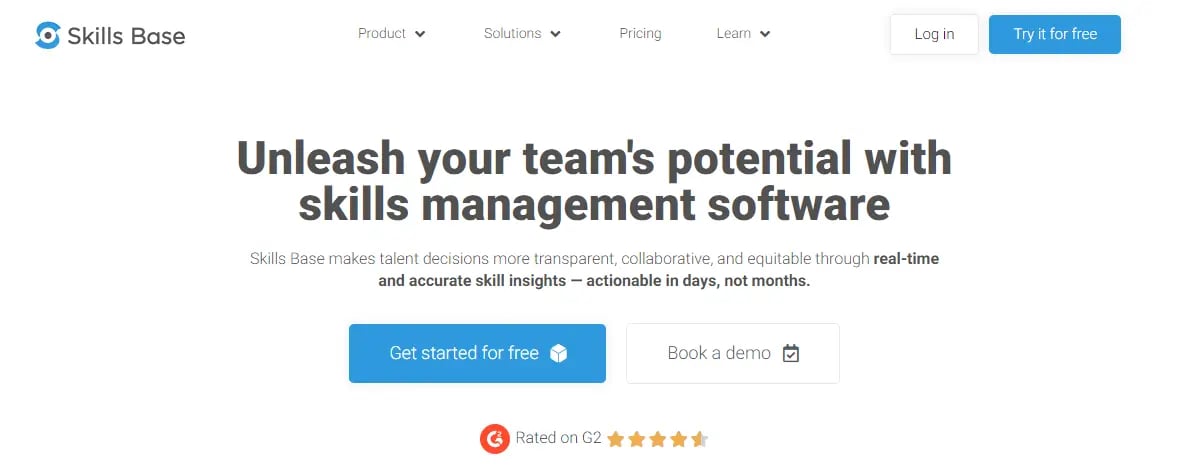 Skills Base gives companies a tool to check out employee abilities and track them over time. This skills Taxonomy platform helps visualize where there are skill gaps, supports employee growth, & aligns personal strengths with what the organization needs.
Skills Base gives companies a tool to check out employee abilities and track them over time. This skills Taxonomy platform helps visualize where there are skill gaps, supports employee growth, & aligns personal strengths with what the organization needs.
Here’s a breakdown of its features
- Skills Assessment and Tracking: Manages employee skill info efficiently.
- Visual Skill Mapping: Uses visuals to show who has which skills.
- Gap Analysis Tools: Pinpoints where more training is needed so people can improve.
- Customizable Reports: Makes reports that fit what your organization cares about most.
- Employee Development Plans: Helps create tailored plans for each employee's growth.
G2 Rating: 4.6/5 (26 reviews)
|
Overwhelmed by scattered skill data and inconsistent frameworks? Discover how iMocha's skills taxonomy tool can centralize your workforce data and provide actionable insights. |
5. IYS
 IYS is all about tech that tracks employee progress on their skills. They help spot gaps so companies can create plans that'll boost productivity & career chances!
IYS is all about tech that tracks employee progress on their skills. They help spot gaps so companies can create plans that'll boost productivity & career chances!
Here’s a breakdown of its features:
- Skill Tracking and Management: Focuses on keeping tabs on how employees grow their talents.
- Gap Analysis and Reporting: Helps find out where improvement is needed.
- Personalized Development Plans: Aids in making customized learning plans for staff.
- User-Friendly Interface: Simple enough for everyone in the company to use!
- Integration with Corporate Training: Works nicely alongside existing training programs.
G2 Rating: NA
6. VibyAderant
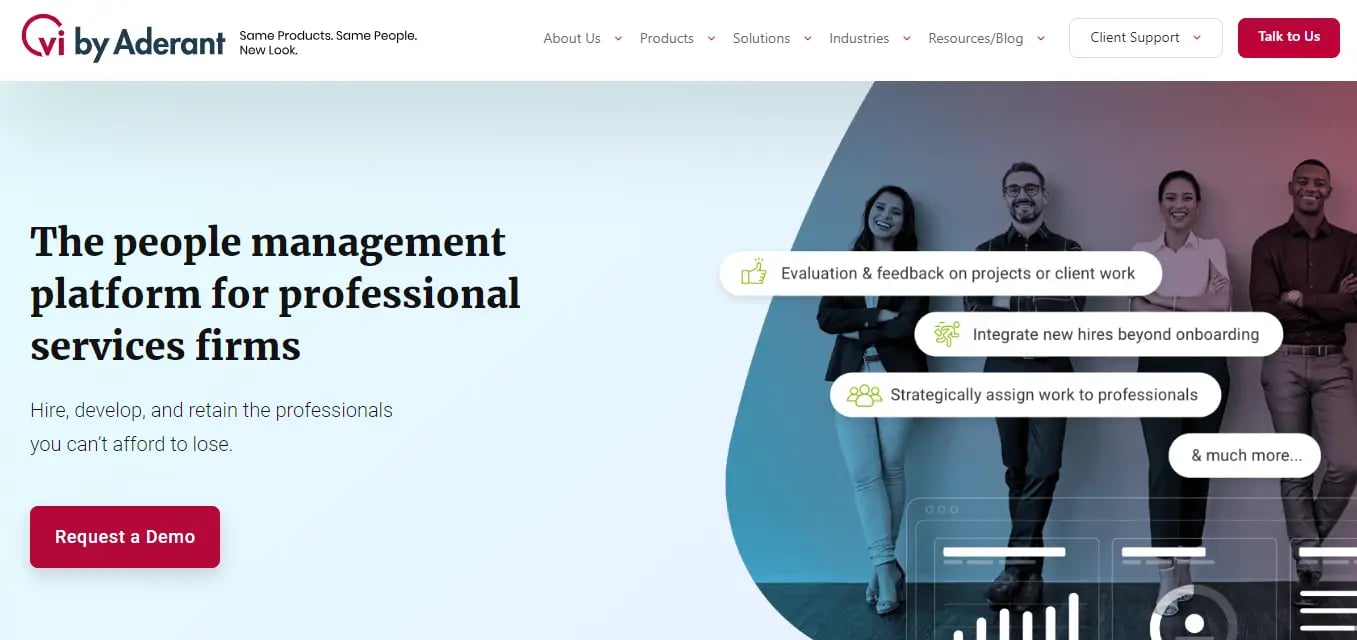 VibyAderant provides tools for keeping track of employee abilities while pushing forward with their career paths. They feature ways to track progress comprehensively & provide analytic tools for growth strategies.
VibyAderant provides tools for keeping track of employee abilities while pushing forward with their career paths. They feature ways to track progress comprehensively & provide analytic tools for growth strategies.
Here’s a breakdown of its features:
- Comprehensive Skill Tracking: Tracks both progress & details on employee competencies.
- Analytics and Reporting: Gives useful analytics that show where team members improve or need work.
- Career Growth Pathways: Supports staff in climbing the corporate ladder by showing clear paths forward.
- Customizable Skill Sets: Adapts according to what specific roles need within an organization.
- Real-Time Data Updates: Keeps everyone’s skill data up-to-date.
G2 Rating: NA
7. Edyoucated
 Edyoucated offers software that lets you tweak skill development programs however you’d like! Focusing on personal learning journeys, they aim to boost performance while aligning everything with company goals.
Edyoucated offers software that lets you tweak skill development programs however you’d like! Focusing on personal learning journeys, they aim to boost performance while aligning everything with company goals.
Here’s a breakdown of its features:
- Personalized Learning Paths: Tailors skill-building programs just right for individuals’ needs!
- AI-Driven Recommendations: Suggests ways employees can improve based on data.
- Employee Engagement Tools: Engages learners through fun features like gamification.
- Integration with Learning Systems: Integrates well with existing e-learning platforms so nothing feels random or out of place.
- Skill Gap Analysis: Looks closely at areas needing improvement; tells exactly where effort should go.
G2 Rating: 4.7/5 (10 reviews)
| Dive into the top 12 skills tracking software that work seamlessly with skill taxonomies to track, tag, and measure workforce capabilities. |
8. MuchSkills
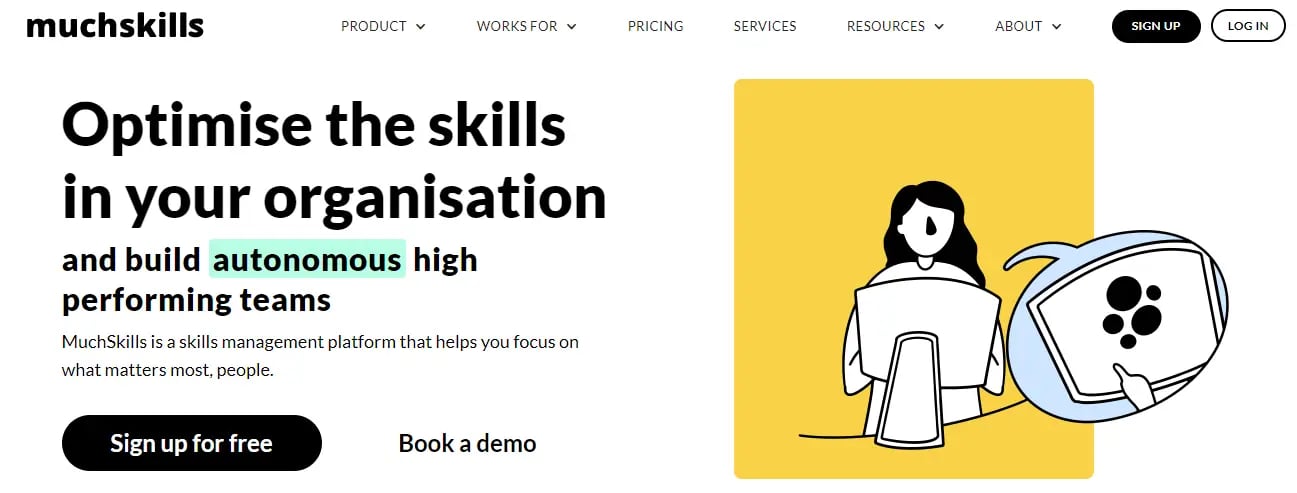 MuchSkills provides visual tools that help teams see their combined variables when it comes to skills! The goal here? To make managing those abilities simpler by pointing out strengths and weaknesses!
MuchSkills provides visual tools that help teams see their combined variables when it comes to skills! The goal here? To make managing those abilities simpler by pointing out strengths and weaknesses!
Here’s a breakdown of its features:
- Visual Skills Mapping: Uses visuals—it makes things clearer when mapping competencies.
- Simple Interface: Muchskills provides a user-friendly and easy-to-navigate layout.
- Team Skill Visualization: Shows teams where they shine and where there’s room to grow.
- Customizable Skill Sets: Adapts nicely based on organizational needs; tailored to teams.
G2 Rating: 4.5/5 (1 reviews)
9. Gloat
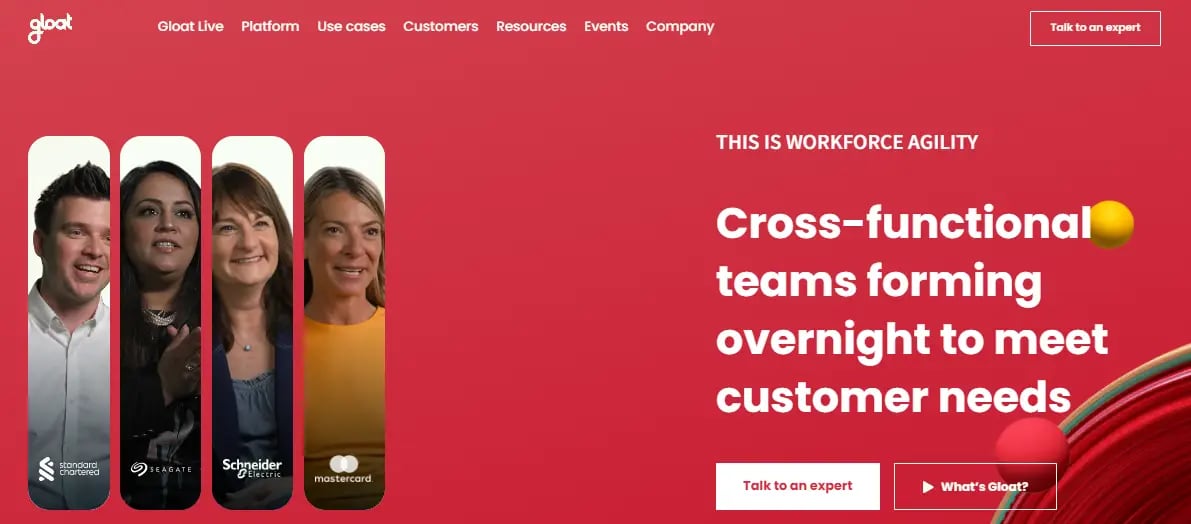 Gloat offers a skills taxonomy solution that helps organizations organize, track, and apply workforce skills data to support internal mobility and talent planning.
Gloat offers a skills taxonomy solution that helps organizations organize, track, and apply workforce skills data to support internal mobility and talent planning.
Here’s a breakdown of its features:
- Dynamic Skills Ontology: Continuously updates based on internal data and labor market trends.
- Internal Talent Matching: Supports mobility by aligning employee skills with open roles and projects.
- Skill Gap Insights: Provides analytics to identify strengths and development areas across the workforce.
- HR System Integration: Connects with existing HR tools for streamlined data management.
G2 Rating: 4.4/5 (34 reviews)
Pricing: Available on request from Gloat.
10. Retrain.ai
 Retrain.ai offers a skills taxonomy solution focused on workforce planning and future skills development, using AI to help organizations manage talent more effectively.
Retrain.ai offers a skills taxonomy solution focused on workforce planning and future skills development, using AI to help organizations manage talent more effectively.
Here’s a breakdown of its features:
- AI-Based Skills Mapping: Builds and updates a skills taxonomy using organizational data and labor market trends.
- Future Skills Forecasting: Identifies emerging skill needs to support reskilling and upskilling initiatives.
- Workforce Planning Support: Helps align talent strategies with evolving business goals.
- Compliance-Focused Design: Includes features for ethical AI use and DEI compliance.
G2 Rating: 4.7/5 (14 reviews)
Pricing: Custom pricing available on request.
| Discover how a skills repository integrates with skills taxonomy to standardize, organize, and track employee skills effectively. |
Conclusion
Navigating today's workforce means more than just spotting skill gaps—it calls for smart plans to build those talents right alongside business aims. Skills taxonomy software serves as the strong foundation we need. It offers the insights & tools needed for solid talent management.
While lots of options exist out there for tracking these necessary capabilities, some like iMocha Skills Intelligence Cloud stand out thanks to their advanced skill-matching features, great integration options, plus real-time analytics! These benefits don't just streamline HR processes; they help create a culture of continuous learning inside your organization! Embracing such comprehensive solutions could really make your organization stand out in a modern, bustling talent management scene.
|
Finding it difficult to keep up with rapidly evolving skill requirements in your industry? Try iMocha Skills Intelligence Cloud. |
FAQ
What is Skills Taxonomy Software?
Skills taxonomy software is a tool that organizes and categorizes skills into a structured framework, helping businesses align employee capabilities with organizational goals.
How to Create a Skill Taxonomy?
Identify relevant skills, group them into categories, define proficiency levels, and align them with job roles and business objectives to create a coherent skills taxonomy.
How Does a Skills Taxonomy Support Employee Development?
It identifies skill gaps, guides personalized learning paths, and aligns employee development with organizational goals, enhancing career growth and performance.

